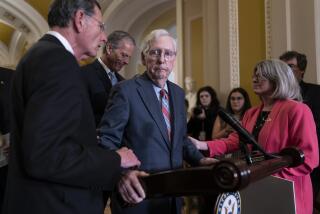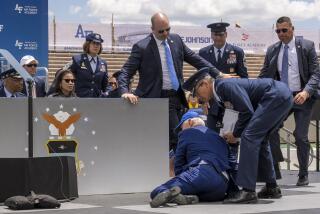Mukasey collapses during speech
- Share via
WASHINGTON — Atty. Gen. Michael B. Mukasey was rushed to the hospital Thursday night after collapsing and losing consciousness during a speech on the war on terrorism, a Justice Department official said.
Mukasey slumped to the floor near the conclusion of his remarks before the Federalist Society’s annual dinner at a northwest Washington hotel, said Peter A. Carr, chief spokesman for the department.
Emergency first aid was rendered by Mukasey’s security detail and a doctor on the scene before the attorney general was taken by ambulance to nearby George Washington University Hospital, Carr said.
“The attorney general is conscious, conversant and alert. His vital statistics are strong and he is in good spirits,” Carr said in a statement today, two hours after Mukasey collapsed shortly before 10:20 p.m. Eastern. “He is receiving excellent care and appreciates all of the good wishes and prayers he has received. The doctors will keep him overnight for further observations.”
Mukasey, a 67-year-old retired federal judge from New York City, was noticeably shaking during the speech at the Marriott Wardman Park hotel before he slumped at the lectern and then collapsed, said another Justice Department official, who spoke on the condition of anonymity because he was not authorized to discuss the matter.
Some attendees in the first few rows formed a circle around Mukasey to shield him from sight until medics arrived.
President Bush was notified of Mukasey’s collapse, White House Press Secretary Dana Perino said. “The president has him in his thoughts and will be kept apprised, and hopes that he will be back up and at ‘em again soon.”
Mukasey became attorney general almost exactly one year ago. He succeeded Alberto R. Gonzales, whose stormy tenure -- marked by criticism that he and his staff had improperly hired and fired lawyers and other officials based on their politics -- ended with his resignation.
Mukasey had enjoyed a stellar reputation as a federal judge in New York, where he presided over significant cases, including the terrorism prosecution of Sheik Omar Abdel Rahman and 11 codefendants charged with conspiring to blow up numerous sites in the city.
After taking the helm at the Justice Department, Mukasey became a lightning rod for criticism from Democratic lawmakers for his steadfast refusal to say what constitutes torture.
But for the most part, even his critics have credited Mukasey with restoring credibility to the Justice Department, where he has launched major initiatives including a crackdown on global organized crime.
Mukasey’s speech Thursday night was one of the longest and most strongly worded of his tenure. In it, he railed against those who criticized the Justice Department for sharply changing its focus after the Sept. 11 attacks from a prosecutorial agency to one that keyed on preventing future attacks -- even if that meant not charging some suspected terrorists with crimes and not prosecuting them in federal courtrooms like the one he presided over.
“As the end of this administration draws near, you would expect to hear broad praise for this success at keeping our nation safe. Instead, I am afraid what we hear is a chorus with a rather more dissonant refrain,” Mukasey’s prepared remarks said. “Instead of appreciation, or even a fair appraisal of the administration’s accomplishments, we have heard relentless criticism of the very policies that have helped keep us safe. We have seen this in the media, we have seen this in the Congress, and we have heard it from the legal academy as well.”
Mukasey was born in New York in 1941 and graduated from Columbia College and Yale Law School, where he was on the board of editors of the Yale Law Journal.
Before becoming attorney general, he had a lengthy career as an attorney, including service as an assistant U.S. attorney from 1972 to 1976 in New York.
From 1975 to 1976 he also served as chief of his district’s Official Corruption Unit.
From 1976 to 1987 he was an associate, and then member, of the firm Patterson, Belknap, Webb & Tyler.
He was appointed to the U.S. District Court for the Southern District of New York by President Reagan in 1988 and served until 2006 -- the last six years as chief judge -- before returning to private practice.
He and his wife, Susan, have two grown children, Marc and Jessica, and two grandsons.
--
More to Read
Sign up for Essential California
The most important California stories and recommendations in your inbox every morning.
You may occasionally receive promotional content from the Los Angeles Times.













